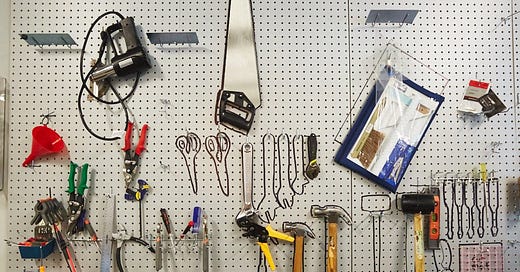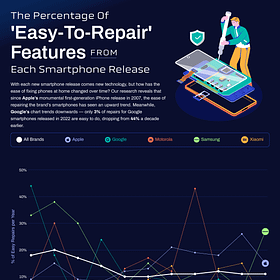Google Goes To Bat For Right To Repair In Oregon
Google said on Thursday that it endorses a legal right to repair - that's BIG! Also: CES's Worst In Show awards. And: check out our Repair Coffee this Sunday with Ugo Vallauri of The Restart Project.
Google, the maker of the Fitbit smart watch, the Pixel phone, Chromebooks and other smart home products announced this week that it has changed its corporate position: backing a legal right to repair. The news, first reported by 404Media came as a Google executive spoke in favor of an Oregon state right to repair bill in a hearing on Thursday.
The company also released a white paper, Google and Repairability, that outlines the steps the company has taken to support device repair - such as its recently announced partnership with iFixit - as well as its changed position on repair.
Google believes users should have more control over repair!
Google believes that users should have more control over repair—including access to the same documentation, parts and tools that original equipment manufacturer (OEM) repair channels have—which is often referred to as “Right to Repair” (R2R). We strongly support initiatives that provide users with greater choice over the repair of their devices, that protect user safety and privacy, and that provide manufacturers with flexibility to drive innovation and to meet users’ evolving needs.
In a blog post, Steven Nickel the Director of Operations for Devices and Services at Google wrote that the company endorsed a right to repair bill introduced by Oregon state senator Janeen Sollman. “This legislation represents an inclusive compromise that brings tech companies, small repair companies, environmental leaders and legislators to the table to find common ground and support the repair movement. This would be a win for consumers who are looking for affordable repair options, for the environment, and for companies that want to invest in making their products more repairable and sustainable,” he wrote.
Nickel was one of three experts to testify in favor of the bill on Thursday.
Thumbs up from right to repair advocates
Right to repair advocates said the tech giant’s support was welcome. “It is harder than it should be to fix the devices we use every day,” said U.S. PIRG Senior Right to Repair Campaign Director Nathan Proctor. “As a result, we are making, using and tossing way too much stuff. Google’s support for a strong Right to Repair bill in Oregon, which includes critical parts-pairing reforms, gives me hope that we can tackle our tech trash treadmill and keep devices working longer.”
“I want to thank all the people at Google who have championed repair and helped the company evolve from its previous opposition. When things break, you fix them. That’s common sense. It is clearer than ever that the Right to Repair is here to stay. After all, people just want to fix their stuff.”
Google isn’t the first tech giant to back right to repair legislation. Apple famously flipped its opposition to a California right to repair bill, which Governor Gavin Newsome passed into law in 2023. The company subsequently called for a federal right to repair law modeled on the legislation passed in California.
So what’s the difference between Google and the other tech giants? For one, they’re actively lobbying to pass right to repair.
Also: Google is backing more comprehensive right to repair legislation than has been passed to date. For example, the company opposes "parts pairing," a practice used by major manufacturers like Apple to exert granular control over simple repairs like part replacement.
Google throws shade on replacement parts, etc.
Which isn’t to say that Google’s endorsement is without its faults. The company’s whitepaper parrots some of the (baseless) concerns about physical safety risks and repair of personal electronics, and does so as a way to take a swing at a pillar of right to repair laws and advocacy: ready access to replacement parts.
“User safety should be a top priority. Improper repair can be dangerous—especially if individuals use faulty parts or are unfamiliar with safety critical components, such as lithium ion batteries,” the whitepaper reads. “Legislation should acknowledge the risks borne by unskilled repairers and allow original equipment manufacturers (OEM) to provide parts assemblies rather than individual components to reduce the risk of injury.“
While there are certainly fire and physical safety concerns linked to Lithium Ion batteries, Li Ion batteries are generally safe to handle, and the risks are often overstated - especially when compared to the handling and physical safety risks of …say…gasoline or propane, which we readily allow consumers to purchase, transfer, store and use at home.
So why disparage the sale of individual components in favor of parts assemblies? Well, as iFixit explained about similar language in the New York state right to repair bill, requiring the sale of parts assemblies where safety is a concern can eliminate some (low level) risks in electronics repair. (Replacing a battery assembly rather than just a battery may make it less likely you’ll damage the battery itself.) However, at a high level, pushing assemblies over discrete part replacement opens the door to OEMs using parts assemblies to indirectly control which repairs happen and which do not. If your smart phone “home button” breaks, for example, being able to purchase a replacement iPhone 8 home button for $20 and install it yourself makes that device easy and affordable to repair. But if that home button is only sold in an “assembly” with a screen and camera for $200, suddenly the scales tilt in favor of replacing (or upgrading) the iPhone 8 - deprecating repair in favor of replacement.
Just sayin’!
Still…a win’s a win!
Still, Google's endorsement is seen as a significant shift from it’s less than squeaky clean history with right to repair and it reflects a changing landscape in the tech industry as major manufacturers are increasingly read the “writing on the wall” as state-level right to repair laws take effect and moderate their previously staunch opposition to right to repair laws.
Microsoft backed a repair bill in Washington State. It died anyway.
☕ Repair Coffee: Ugo Vallauri @ The Restart Project
Join us this Sunday afternoon for our January Repair Coffee (get it? ;-). This is a live, online conversation highlighting the latest right to repair news.
Our special guest is Ugo Vallauri of The Restart Project, which “aims to tackle the climate emergency by making electronics work for people, for the planet, and for longer.” Ugo leads their international partnerships and on policy work pushing for Right to Repair.
Worst In Show Exposes The Rot Under CES’s Shiny Exterior
Now in its third year, the CES Worst In Show Awards called attention to the darkness lurking behind the annual orgy of consumerism that is the Consumer Electronics Show. The panel of dystopia experts who review CES news releases, punch through the hype and reveal the subtle ways that products jeopardize our safety, encourage wasteful overconsumption, and normalize privacy violations. Fight to Repair editor in chief Paul Roberts awarded the worst in show for cybersecurity to the Chinese robot vacuum maker. An analysis of the device at the recent Chaos Communication Congress in Germany uncovered numerous, serious security flaws and design lapses that put that data at risk of theft or misuse.
In addition to the “Worst in Show” for cybersecurity, this year’s event saw Worst In Show awards for Privacy (awarded by Cindy Cohn, Executive Director, Electronic Frontier Foundation); Repairability, selected by Kyle Wiens (CEO, iFixit); environmental impact, selected by Shanika Whitehurst, Consumer Reports; and the new category of “Enshittification” selected by Cory Doctorow (Sci-Fi author, Electronic Frontier Foundation and Pluralistic.net).
Check out the video below!
Other News
Batterygate victims are receiving $92 for their trouble after Apple lost a class-action lawsuit. The company settled the case in 2020 for $500 million and is being forced to pay up to US resident’s who owned an affected iPhone model and submitted a claim.
Migrant tailors and clothing repairers who have moved to Amsterdam have create the United Repair Centre, a business that is fixing clothes rather than making them new. Instead of forcing these workers into low quality jobs, this business is relying on their skills and knowledge to build a thriving business focused on repair.
Our reliance on mass production makes design increasingly important when creating solutions to our problems of waste and overconsumption. While recycling and ideas of circular economy are all the rage, the late designer Victor Papanek reminds us that every product starts as an idea, and that without careful considerations we are bound to end up with problems down the line.

Source: Christopher Roosen What killed modular phones? You might be upset that Google went all in on Google Glass instead of their modular phone project, the history of the failed project is complicated. Saptarshi Bandyopadhyay writes that a combination of issues with gathering users due to a lacking app store ecosystem and heightened pricing of parts kept Google from fulling launching this project even after a viral launch of their concept video.








